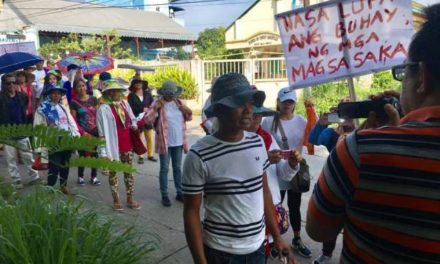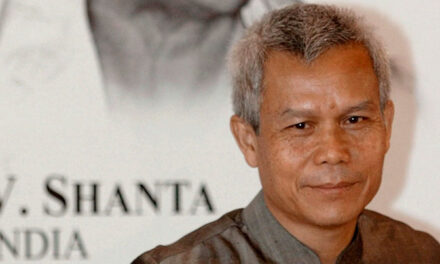21 September, The Daily Star
http://www.dailystar.com.lb/article.asp?edition_id=10&categ_id=2&article_id=8569
Following three intense days of garrulous debates, dramatic proposals, and trips to Palestinian refugee camps, activists in the Anti-War and Anti-Globalization conference in Beirut produced a brief final statement on Monday defining their position.
During the “Where Next for the Anti-War and Anti-Globalization Movement?” conference, which was held from Sept. 17-19 at Le Bristol Hotel in Beirut, some 300 peace and human rights activists, intellectuals and delegations representing every continent on the planet gathered to protest and find a counter-measure to the spreading threat of what they called the “U.S.-Israeli axis.”
Great figures and veteran activists attended the meeting, and as one of the speakers from the Anti-War Coalition of South Africa, Salim Vally told The Daily Star “there are great expectations from around the world from this meeting and some people have traveled for days through hardships, especially the Palestinians, to get here.”
According to the statement read by leading activist and executive director of Focus on the Global South organization, Walden Bello, the activists did pull together with Islamic movements to call for an end to the occupation of Iraq and the Palestinian territories.
“We support the right of the people of Iraq and Palestine to resist the occupations,” read the statement.
“We call for the unconditional withdrawal of ‘coalition’ forces from Iraq. We demand the end to the Israeli occupation of Palestine. We demand the dismantlement of the Apartheid Wall and all settlements. We ask for the release of all Palestinian and Iraqi political prisoners.”
The statement further stated the movement’s support to the Iraqi and Palestinian people, and “saluted the Lebanese resistance (Hizbullah) that inspires us the world over.”
However, the last line of the statement – set apart from the bullet-points demanding, calling for and supporting the struggle against imperialism and corporate globalization dominated by the U.S. and Zionists – was a harsh return back to reality.
“We will build our solidarity through common campaigns, and this positive dynamic of dialogue and common action must continue.”
However, no mentions of said common campaigns were noted in the statement.
The Iraqi and Palestinian delegations had proposed and requested many things in the separate meetings held to discuss each country’s situation.
The Iraqis had requested a counter conference of intellectuals and activists inside Iraq and a committee of lawyers to defend the female and children prisoners in U.S. captivity, among other demands.
The Palestinians called for an anti-Israel apartheid movement and an international public hearing against Israeli Prime Minister Ariel Sharon.
Other delegations also proposed issues fundamental to the movement’s basic logistics, such as changing the name to something more positive, or allowing organizations more autonomy within the movement. Or even assigning a living symbol to the movement, such as Marwan Barghouti, as Nelson Mandela was to the South Africans. No such mention was given in the final statement.
Nonetheless, some of the movement’s aims were achieved. According to Bello, “the biggest achievement of this conference is the way that it was able to bring together the global peace and solidarity movements into a closer dialogue and association with its counterparts in the Arab and Muslim worlds … especially at a time when the United States is using attacks on Islam in order to push foreign policy objectives.”
But as retired Admiral in the Indian Army turned peace activist Ramu Ramdas put it, “you can’t expect the rest of the world to raise its voice (against the wars in Iraq and Palestine), when (neighboring) Arab countries are doing the least.”
(This article appeared on page 1 of The Daily Star, a Lebanese daily distributed with the International Herald Tribune in the Middle East)






![[IN PHOTOS] In Defense of Human Rights and Dignity Movement (iDEFEND) Mobilization on the fourth State of the Nation Address (SONA) of Ferdinand Marcos, Jr.](https://focusweb.org/wp-content/uploads/2025/07/1-150x150.jpg)

